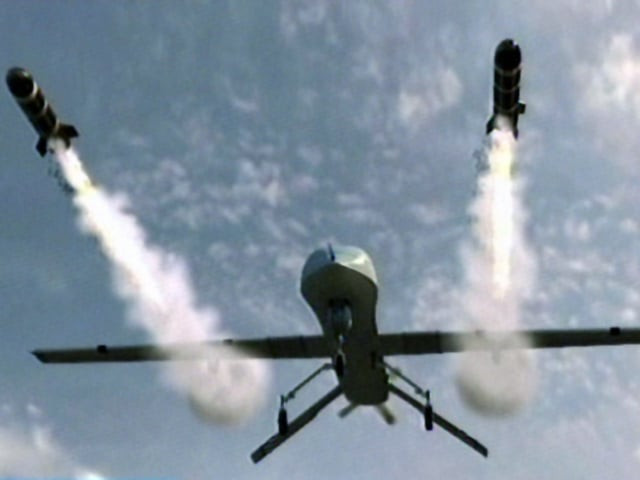First US drone attacks in weeks kill 11
A second drone attack at night kills at least 4 after attack in the morning killed 7.

They were the first such attacks in a month as a diplomatic feud strains US-Pakistani ties.
Missiles fired early on Monday from an unmanned aircraft killed seven people at a suspected militant training centre in Azam Warsak, just west of Wana, the main town in the South Waziristan tribal agency, local intelligence officials said.
"According to initial reports, there were foreigners among the dead," one of the officials said. A second official said the foreign nationals killed included three people from Turkmenistan and two Arab nationals.
The following night, another drone fired four missiles at a house in a village near Miranshah in North Waziristan, a hotbed of insurgent activity along the Afghan border, intelligence officials said.
It is the first time since January 23 that intelligence officials have reported US drone attacks, marking a resumption of a campaign that has become the centerpiece of US efforts to halt militants launching attacks on its soldiers in Afghanistan.
Many analysts believe Washington halted the attacks for weeks to avoid further inflaming anti-American fury in Pakistan just as it pressures Islamabad to release Raymond Davis, a USconsulate employee imprisoned after shooting two Pakistanis last month in what he said was an attempted robbery.
Others speculate the pause was due to poor weather or an inability to find reliable targets as militants hunt down Pakistanis they believe are passing intelligence information.
Washington, which provides Pakistan with billions of dollars a year in military and civilian aid, is leaning hard on the government of President Asif Ali Zardari to release Davis on grounds the US national is shielded by diplomatic immunity.
Risk, necessity for Pakistan
Yet neither can the government afford to unleash popular fury in a case that has galvanised anti-American sentiment in Pakistan. Protesters have burned US flags and demanded the Davis be tried for murder in local courts.
Davis, whose precise connection to the US government has not been specified, is locked in a jail in the city of Lahore after a hearing on his immunity was delayed until March 14.
Talat Masood, a retired Pakistani general and military analyst, said the United States may have resumed the raids in a recognition that the case may drag out for some time.
The drone strikes, which are not publicly acknowledged by either country, are another delicate situation for the vulnerable Zardari government, battling an insurgency of its own and struggling to hold together a fragile coalition.
The attacks are seen as a risk and a necessity for Pakistan, under pressure from its chief ally in the West to do more against militants but also facing mounting resentment from Pakistanis who see the government as bowing to US wishes.
There is also growing debate over the effectiveness of the strikes, which have killed al Qaeda and Taliban figures but have been unable to reach senior militants living in cities like Quetta and Karachi that Pakistan has made off-limits to strikes.
According to a new report in the Washington Post, only two of the drone attacks in Pakistan last year killed militants who were senior enough to appear on a US most-wanted list.
Citing data from government and independent sources, the Post said that despite an escalation in the attacks the number of high-ranking militants killed was modest and may have slipped.













COMMENTS
Comments are moderated and generally will be posted if they are on-topic and not abusive.
For more information, please see our Comments FAQ